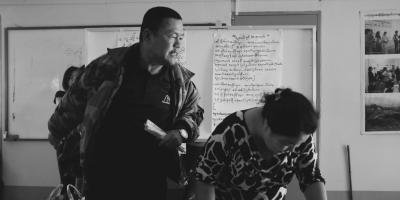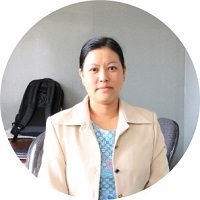
The story goes as follows: A wife confronts her husband with allegations of an extramarital affair. The husband’s reaction is violent; yelling and screaming, he beats her. She goes to seek help from a local administrator – but falls on deaf ears.
In a second version of the story, the audience is invited to jump in and suggest a solution. The role of the local administrator is taken on by a member of the audience. The administrator now takes time to listen to the wife’s complaints. He admonishes the husband, reminding him that it is illegal to use violence to resolve a dispute. Next time, the administrator says, he will arrest the husband.
The script is taken from a play on domestic violence performed for the local community of Taunggyi in Myanmar, part of a series of local theater performances facilitated by the Rule of Law Centres Initiative with support from IDLO and UNDP. The performances are based on real accounts of injustice faced by the people in the community and deal with topics such as domestic violence, drug use, child abuse and street children.
Using community theater to increase access to justice
| Watch the story unfold |
|
A theater group performs a play on domestic violence for the local community in Taunggyi, Myanmar Video credit: Sunra Lambert-Baj, IDLO |
Reaching nearly 1,000 community members in Taunggyi and Mandalay so far, the rule of law-themed plays are the result of a series of workshops that have been organized to introduce community theater techniques as a way of enhancing public legal awareness and increasing access to justice in Myanmar. Implemented in partnership with Human Drama – a British Council supported project managed by the local NGO Arts for All – the workshops give participants the skills to implement participatory theater, teaching them how to gather stories, write scripts, facilitate performances, act on stage and engage with audiences.
“Before we go to the community, we first take assessment trips to determine what justice or rule of law issues are prevalent in that community. Then, we write the performance script ourselves by utilizing the backbone story from the training that the Rule of Law Centre provided,” said Ms. Arkar Sein, a civil society representative who attended two courses at the Mandalay Rule of Law Centre: the ‘Foundations in Rule of Law’ course and the human drama training.
Critically, the format of the plays allows the audience to interject and make subtle alterations to the story to change the course of events for the better. Not only does this interactive set-up encourage the audience to engage directly with the justice issues presented, but it also calls for their critical analysis of the forces contributing to the problem and a realistic examination of potential solutions. It is not common for people in Myanmar to openly discuss their thoughts and feelings, and the theater groups have to work hard on winning the trust of the audience.
The participatory, theater-based approach helps to introduce Rule of Law Centre activities to new audiences. It enables communities – regardless of their socio-economic background – to engage on local justice issues in a way that is both entertaining and educational. Songs and music are used to set out the problem and summarize solutions, serving as easy-to-remember lessons for the audience. “The community participates in the performance, and we give them information about rule of law concepts and principles. They enjoy the role play activities,” Ms. Arkar Sein explained.
Long-term sustainability and local ownership
Participants include lawyers, community activists and youth leaders. Several graduates of these workshops have gone on to form local organizations that now regularly organize performances on priority issues in their communities, thus enhancing the long-term sustainability and local ownership of the project. Community theater has the potential to not only raise public legal awareness but also to enhance the dialogue and bridge the gap between local communities, civil society organizations and formal justice institutions.
After attending the human drama training, Ms. Arkar Sein founded an organization called ‘Life Drama’. "We already have 22 members in our organization," she said. "We replicated the community theater training around Mandalay City and Kyauksal Township to build awareness on justice issues in the community, especially for children and those who are less educated.”
She added that community theater makes it easy to grab the audience’s attention. “The reason that I chose to found this type of organization rather than replicating rule of law training is that common people don’t understand the forum format. Some people cannot even read when we give them handouts from the training; but for the drama, they are very interested to watch.”
Ms. Thida Aye is a librarian at Balangartan library and a graduate of two courses at the Taunggyi Rule of Law Centre. She founded an organization called ‘Future Light Drama’ that has already performed four times in the Taunggyi region. “After graduating from the Rule of Law Centre, I started knowing my rights,” she said. “For example, I was afraid to open a library in my ward before. But after I attended the training from the Centre, I realized that I’m not violating other people’s rights, and I’m doing a good thing for my community.”
“The community theater activity is very effective for people who are not educated because we can raise awareness visually. We always choose a plot that is happening in reality in our community. Having lawyers in our organization also is a great opportunity because when we perform the drama, we give the audience knowledge about the law.”
 |
Arkar Sein, Civil Society Representative, Mandalay |
 |
Thida Aye, Librarian, Taunggyi |
Community outreach by the Myanmar Rule of Law Centres
The workshops form part of a series of outreach initiatives implemented to provide information on rule of law issues to the public in Myanmar and to broaden the reach of the Rule of Law Centres. The outreach initiatives seek to generate interest among new audiences through the use of creative and innovative approaches – such as community theater, legal awareness materials, radio and digital platforms, and online training courses via the Rule of Law Centres website. The Rule of Law Centres also offer the groups space for meetings or rehearsals, access to the Rule of Law Centres Graduate Support Fund and technical support on rule of law issues.
The Rule of Law Centres Initiative, launched in 2014 by UNDP at the request of the Pyithu Hluttaw Rule of Law and Tranquility Committee and now guided by the Coordinating Body for the Rule of Law Centre and Justice Sector Affairs, helps increase trust and cooperation between justice providers and the communities they serve. IDLO and UNDP, under their global partnership agreement, have established four nationally operated Rule of Law Centres in Myanmar to provide communities with the knowledge, skills and values they need to address local justice issues through training, dialogue and access to resources.
Photo credit: Sunra Lambert-Baj, IDLO
Learn more:

